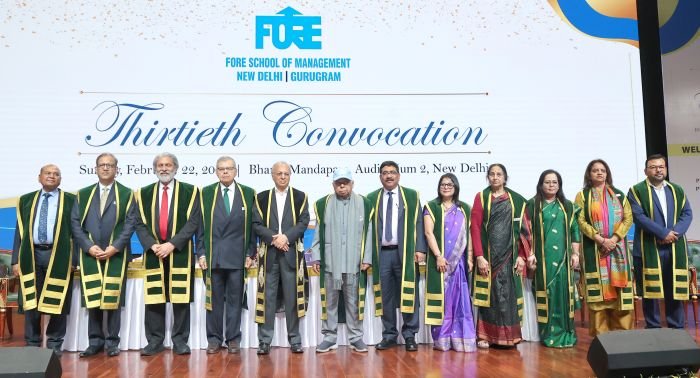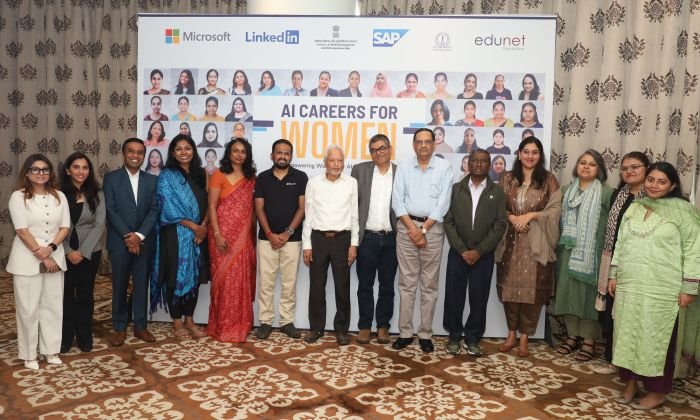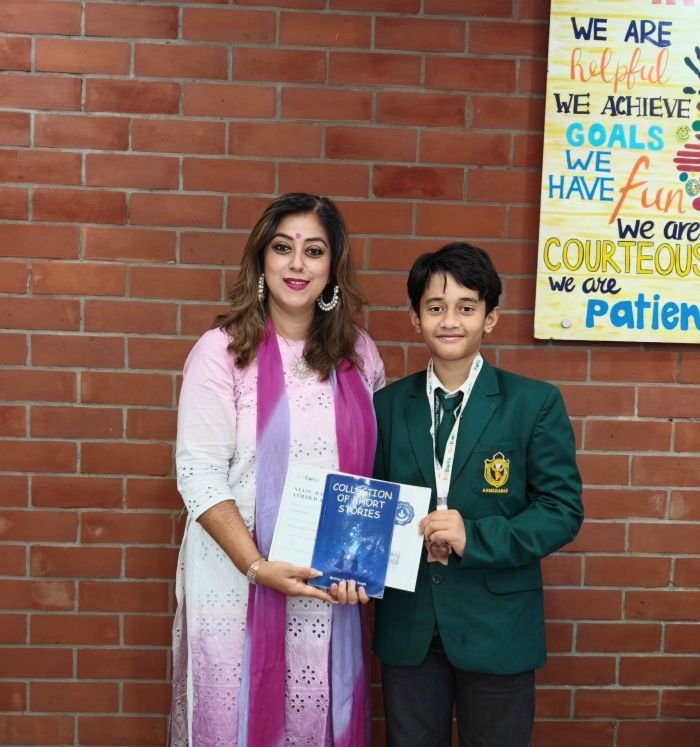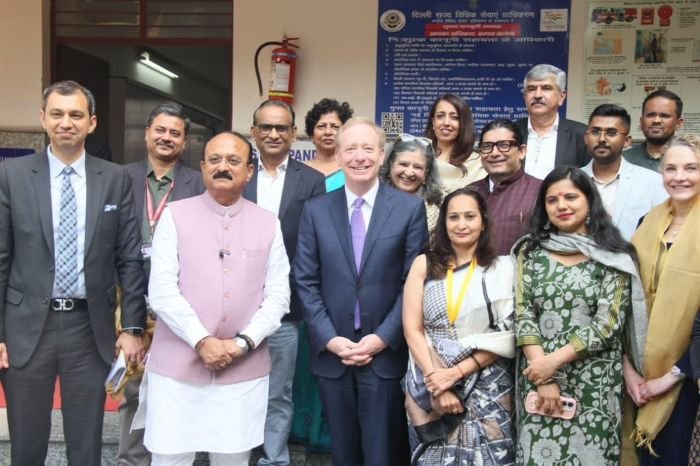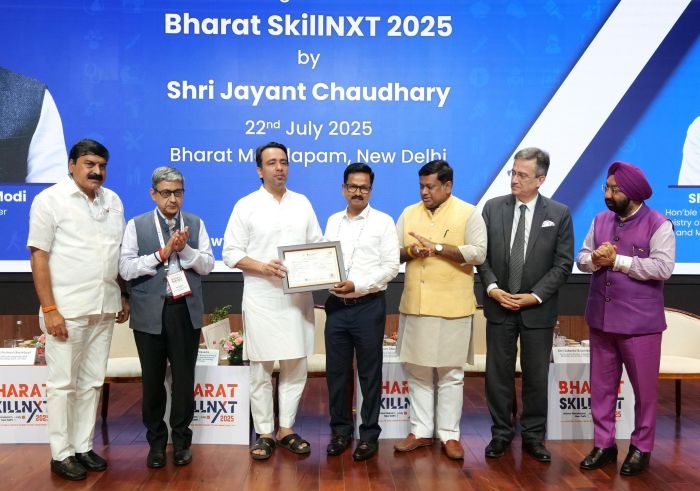
MSDE Celebrates 10 years of Skill India Mission by a comprehensive consolidation, revamp and renewed vision for accelerating the mission
The Skill India ecosystem led by the union ministry of Skill Development and Entrepreneurship (MSDE) on July 22, 2025 came together to celebrate the completion of 10 years of Skill India Mission by hosting a grand conference cum exhibition under the title of ‘BharatSkillNxt 2025’ at Bharat Mandapam, New Delhi. The event a culmination of week-long celebratory events, spotlighted the mission’s achievements and unveiled a futuristic roadmap for India’s skilling ecosystem. Among a slew of announcements made at the landmark event was the launch of SOAR (Skilling for AI Readiness).
Jayant Chaudhary, Minister of State (I/C), MSDE, who is seen instrumental in driving big changes in skilling sector and showing quality leadership speaking on the launch of SOAR in backdrop of the international AI Summit of world leaders scheduled in India early next year, said the country has six months to take SOAR to every school and make a global statement of having the world’s largest AI literate young population during the upcoming global AI event. “In the next six months, India’s school-going population could make a powerful global statement—that we are home to the world’s largest network of young learners who are not just being introduced to AI, but actively using and applying it. This is the future we are building—bold, tech-savvy, and ready to lead,” he said.
SOAR (Skilling for AI Readiness) is aimed at embedding AI awareness and foundational skills among school students (Classes 6–12) and building AI literacy among educators. The programme seeks to bridge the digital divide by ensuring equitable access to AI education across geographies, thereby supporting the national agenda of inclusive, future-ready skilling. SOAR comprises three progressive 15-hour modules for students—AI to be Aware, AI to Acquire, and AI to Aspire—and one independent 45-hour module for teachers titled AI for Educators. The program introduces concepts such as AI basics, generative AI, AI in daily life, programming fundamentals, ethics, cybersecurity and future career opportunities.
The BharatSkillNxt 2025 event also witnessed the exchange of multiple high-impact MoUs. Notable among these was the MoU between MSDE and the Government of the French Republic. After signing the MoU, Thierry Mathou, Ambassador of France, said, “Rooted in mutual respect and people-to-people exchanges, Indo-French partnership in the field of vocational education and skill development reflects a shared vision for the future. Today’s MoU is not merely a document—it is a bridge between two nations committed to empowering youth, building resilient economies, and promoting social mobility through skill-based learning. As India moves forward to train millions under the Skill India Mission, and France continues to advance its ambitious training policies, our collaboration opens up new frontiers. From joint curricula to Centres of Excellence, from talent exchange to innovation-led training, we are laying the foundation of a future-ready workforce. This partnership reflects our conviction that skills are not just tools for employment—they are instruments of dignity, progress, and global harmony.”
Other MoUs included partnerships between NSTI Bangalore and SLN Technology under the DST scheme, NSTI Mumbai and ICICI Foundation for rural incubation, and a series of Flexi MoUs between RDSDEs and prominent industry and academic institutions, including Dixon Technologies, Microsoft, HCL, Apollo MedSkills, and premier institutions like IIT Patna, IIIT Una, RRU Gandhinagar, IIT Hyderabad, and NIT Agartala under PMKVY’s institutional strengthening strategy.
 Speaking about the skilling imperative and future agenda of Skill India Mission, the minister made a passionate case for supporting and engaging in skilling by every stakeholder to remain relevant and progressing. “Skill India journey has shown us that skilling is not a fallback; it is the foundation. Whether it’s veterans retraining, rural women discovering entrepreneurship, or young students embracing AI, every story reaffirms that India’s future lies in recognizing talent, restoring dignity to work, and creating opportunity through skill. Initiatives like SOAR—integrating AI from the school level—signal India’s ambition to not only embrace technology but to lead in it. As we move towards Viksit Bharat 2047, it is clear that India will not become a developed nation by chance—but by design. And at the heart of that design is our people—skilled, confident, and future-ready.”
Speaking about the skilling imperative and future agenda of Skill India Mission, the minister made a passionate case for supporting and engaging in skilling by every stakeholder to remain relevant and progressing. “Skill India journey has shown us that skilling is not a fallback; it is the foundation. Whether it’s veterans retraining, rural women discovering entrepreneurship, or young students embracing AI, every story reaffirms that India’s future lies in recognizing talent, restoring dignity to work, and creating opportunity through skill. Initiatives like SOAR—integrating AI from the school level—signal India’s ambition to not only embrace technology but to lead in it. As we move towards Viksit Bharat 2047, it is clear that India will not become a developed nation by chance—but by design. And at the heart of that design is our people—skilled, confident, and future-ready.”
He also unveiled several key initiatives aimed at shaping the future of India’s skilling landscape including the IndiaSkills 2025–2026 Operational Guidelines and Registration Portal, NCVET’s KaushalVerse Digital Enterprise Portal, Assessment Agencies and Awarding Body Guidelines, and the All New Apprenticeship Training Portal. Reports and handbooks released included the India Semiconductor Workforce Strategy, Skill Impact Bond Report, Decentralized Planning Book, and the JSS Employability Skills Trainer Handbook.
Speaking at the conference, Jitin Prasada, MoS Commerce and Industry and Electronics & IT, said, “Skilling today is about readiness for global mobility, cybersecurity, climate resilience, and digital productivity. With initiatives like FTAs, semiconductor manufacturing, and AI summits, India is on the move. And as we continue this journey—from action to impact—it is our shared responsibility to ensure that every young Indian, armed with talent and training, has a level playing field and a world of opportunity.”
Dr. Sukanta Majumdar, Minister of State for Education, added, “Guided by the vision of our Hon’ble Prime Minister, the National Education Policy 2020 has mainstreamed vocational education and placed skills at the heart of India’s educational journey. With the National Credit Framework and initiatives like SOAR and AI-integrated learning from school level, we are building true choice, mobility, and opportunity into our system. From rural heartlands to technology hubs, we are seeing a generation of learners—especially our daughters—rising with confidence, creativity and curiosity. This is not just about preparing youth for employment; it is about preparing them for life. Together—with MSDE, the Ministry of Education, states, academia and industry—we are building a Kaushal Bharat for a Vikshit Bharat.”
During the event, candidates from the National Apprenticeship Promotion Scheme (NAPS), National Institute for Entrepreneurship and Small Business Development (NIESBUD), JSS, PM Vishwakarma, Skill Impact Bond, and Indian Institute of Entrepreneurship (IIE) shared their experiences, showcasing the tangible on-ground impact of MSDE schemes. This was followed by the felicitation of high-achieving candidates from these flagship schemes. Six best-performing ITIs were also honored, highlighting excellence in vocational training delivery.
Key announcements and releases:
- MSDE officially launched IndiaSkills 2025-2026, marking the opening of the national registration window for candidates aspiring to represent India at global skill competitions. Alongside, the operational guidelines for IndiaSkills 2025 were released, providing a clear framework for the conduct of district, state, and national-level competitions. Registration Link: https://www.skillindiadigital.gov.in/account/register?returnUrl=%2Findia-skills-2025&utm_source=BannerClicks&utm_medium=Web&utm_campaign=IndiaSkills
- The ministry announced the Skill Impact Bond (SIB) India’s first, and the world’s largest, outcomes-based development impact bond for skilling and employment. Led by the MSDE through the NSDC, SIB has mobilised $14.4 million to transform how skilling is financed, with a clear focus on employment outcomes.
- The National Council for Vocational Education and Training (NCVET) operationalized its advanced Digital Enterprise Portal (DEP), officially named KaushalVerse. This state-of-the-art platform has been developed to streamline and democratize the core regulatory functions of NCVET, ensuring efficient, transparent, and responsive service delivery in the skill ecosystem.
- NCVET also launched the Revised Comprehensive Guidelines for the Recognition and Regulation of Assessment Agencies – 2025. These guidelines mark a significant step forward ensuring standardized, transparent, and outcome-based assessment across the country.
- NCVET also launched the revised ‘Guidelines for the Recognition and Regulation of Awarding Bodies’, (2025), to align with the evolving education and employment ecosystem and NEP 2020 and the National Credit Framework (NCrF). These guidelines accentuate the integration of vocational education into mainstream systems, promoting flexible, multidisciplinary learning pathways.
- `The MSDE launched a book titled “Transforming Skill Development through Decentralized Planning”, developed under the SANKALP The book presents a comprehensive account of how District Skill Development Plans (DSDPs)—crafted by District Skill Committees across India have shifted the paradigm from top-down policy to grassroots-led skill planning.
- NCVET along with MSDE announced a strategy report aimed to align India’s workforce capabilities with the evolving demands of the global semiconductor value chain. The report identifies skilling requirements across the semiconductor value chain, including design, fabrication, Assembly Testing Marking and Packaging (ATMP), and ancillary services.
- The Minister also launched the 60-hour Employability Skills Handbook for the Jan Shikshan Sansthan (JSS) Specifically designed for non-literates, neo-literates, and school dropouts, this customized handbook equips learners with foundational skills essential for self and wage employment. Developed in collaboration with 1M1B, the handbook covers practical modules including communication, digital and financial literacy, customer service, entrepreneurship, and career readiness.
- The revamped Apprenticeship Training (AT) Portal, was also launched featuring a significantly enhanced User Interface and User Experience (UI/UX). The upgraded portal is designed to make the apprenticeship lifecycle—right from registration and onboarding to certification—simpler, faster, and more intuitive for all stakeholders, including employers, apprentices, and training providers.
- MoUs with MSDE:
- MoU was signed between the RDSDE Telangana under the DGT and Apollo MedSkills, the healthcare skilling arm of Apollo Hospitals to deliver industry-relevant and job-oriented training programs in the healthcare and allied sectors, with a special focus on enhancing the employability of youth from rural areas.
- An MoU was signed with SLN Technology under the DST scheme under MSDE, for a “Semiconductor Technician” course at NSTI Bangalore. Implemented under the Dual System of Training with SLN Technologies, the program aims to skill youth in advanced electronics.
- An MoU was signed with the Indian Institute of Information Technology (IIIT), Una, to strengthen industry-aligned skill development. As an Institute of National Importance (INI), IIIT Una will offer high-quality, aspirational training in emerging job roles. Under PMKVY 4.0, it will train 120 candidates in Una, Himachal Pradesh, focusing on the Electronics and IT-ITeS sectors—specifically as Electrical Technicians and Software Programmers—supporting the region’s deep-tech and digital workforce needs.
- An MoU was signed with the Indian Institute of Technology (IIT), Hyderabad, to enhance vocational training aligned with industry needs. As an Institute of National Importance, IIT Hyderabad will serve as a training partner under PMKVY 4.0, delivering high-quality courses and curriculum updates. In Sangareddy, Telangana, it will train 280 candidates in Electronics, Hydrocarbon, and Capital Goods sectors, with roles such as CNC Programmer, AI–ML Engineer, and Green Hydrogen technologist.
- An MoU was signed with IIT Patna to drive industry-aligned skilling through an Institute of National Importance. Under PMKVY 4.0, IIT Patna will train 1,440 candidates in Patna, Bihar, across sectors such as Agriculture, Green Jobs, Electronics, and Healthcare. Proposed job roles include Kisan Drone Operator, EV Service Technician, Biomass Depot Operator, Elderly Caretaker, and AR/VR Engineer—supporting sustainable, inclusive, and tech-enabled development in the region.
- An MoU was signed with NIT Agartala to enhance skilling through a blend of traditional and tech-driven job roles. As an Institute of National Importance, NIT Agartala will train 370 candidates in West Tripura under PMKVY 4.0. The training will span sectors like Automotive, Electronics, Handicrafts, and IT-ITeS, with roles including Automotive IoT Technician, CNC Programmer, Bamboo Work Artisan, and AI–Data Scientist—supporting inclusive and future-ready workforce development.
- An MoU was signed with Rashtriya Raksha University (RRU) to strengthen skill development through an Institute of National Importance. Under PMKVY 4.0, RRU will train 240 candidates in Gandhinagar, Gujarat, across sectors like Beauty & Wellness, Electronics, IT-ITeS, and Management. The proposed job roles—Yoga Wellness Trainer, AI & Cybersecurity Associate, IoT Associate, and Fire Safety Officer—combine digital, wellness, and safety-focused skills to build a future-ready and holistic workforce.


